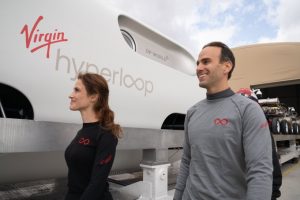 Virgin Hyperloop has tested the world’s first hyperloop passenger tests at the test track in Las Vegas, turning the “breaking technology into reality”. With the successful test, “we have shown that this spirit of innovation will in fact change the way people everywhere live, work, and travel in the years to come,” Richard Branson, Founder of the Virgin Group, said.
Virgin Hyperloop has tested the world’s first hyperloop passenger tests at the test track in Las Vegas, turning the “breaking technology into reality”. With the successful test, “we have shown that this spirit of innovation will in fact change the way people everywhere live, work, and travel in the years to come,” Richard Branson, Founder of the Virgin Group, said.
Josh Giegel, the CTO and Co-Founder, and Sara Luchian, the Director of Passenger Experience, ride the first new form of transport in over a century. With the new technology, the hyperloop passenger tests were performed at speeds of 107 m.p.h. in 6.25 seconds at the DevLoop test site in Las Vegas, where the company has previously run over 400 un-occupied tests.
“When we started in a garage over 6 years ago, the goal was simple – to transform the way people move. “We took one giant leap toward that ultimate dream, not only for me, but for all of us who are looking towards a moonshot right here on Earth,” Josh Giegel, Chief Technology Officer of Virgin Hyperloop, said.
The occupants made their maiden voyage on the newly-unveiled XP-2 vehicle, designed by BIG – Bjarke Ingels Group and Kilo Design, which was custom-built with occupant safety and comfort in mind. While the production vehicle will be larger and seat up to 28 passengers, this 2-seater XP-2 vehicle was built to demonstrate that passengers can in fact safely travel in a hyperloop vehicle.
“Hyperloop is about so much more than the technology. It’s about what it enables. To me, the passenger experience ties it all together. And what better way to design the future than to actually experience it first-hand, Sara Luchian, Director of Passenger Experience for Virgin Hyperloop said explained.
Sultan Ahmed Bin Sulayem, Chairman of Virgin Hyperloop, who watched this historic passenger testing first-hand said that he had a “tremendous faith in the team at Virgin Hyperloop to transform this technology into a safe system. We are one step closer to ushering in a new era of ultra-fast, sustainable movement of people and goods.”
The testing campaign, from the beginning all the way through to the successful demonstration, was overseen by the industry-recognized Independent Safety Assessor (ISA) Certifer. Having undergone a rigorous and exhaustive safety process, the XP-2 vehicle demonstrates many of the safety-critical systems that will be found on a commercial hyperloop system and is equipped with a state-of-the-art control system that can detect off-nominal states and rapidly trigger appropriate emergency responses.
The announcement builds off of significant momentum on the regulatory front. In October, Virgin Hyperloop unveiled West Virginia as the location for the Hyperloop Certification Center (HCC), that will pave the way for the certification of hyperloop systems in the US and around the world, the first step towards commercial projects. In July 2020, the US Department of Transportation (USDOT) and the Non-Traditional and Emerging Transportation Technology (NETT) Council unveiled the guidance document on a clear regulatory framework for hyperloop in the United States.
At the beginning of this year, the Ministry of Transport of Saudi Arabia has commissioned Virgin Hyperloop One to conduct a pre-feasibility study on the use of hyperloop technology for freight and passenger transport.
The Virgin Hyperloop technology will see vehicles transporting passengers and goods at speeds of over 1000 km/h, three times faster than high-speed rail transport.
Share on:



